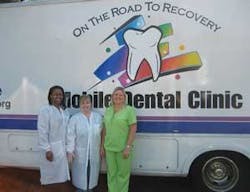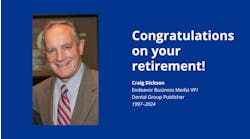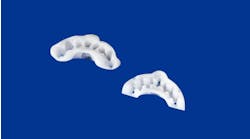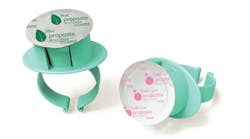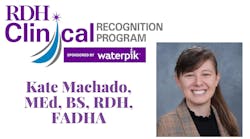Nigerian transplant finds a second career in dental hygiene and a home away from home at New York’s Phoenix House.
by Cathy Hester Seckman, RDH
When I sat next to a stranger at lunch at the most recent RDH Under One Roof conference and started talking about loupes, I didn’t realize just how extraordinary my lunch companion was. It didn’t take long before curiosity got the best of me.
“Where are you from?” I asked her. She had an unusual accent that I thought might be Caribbean. She smiled at the question she hears often. “I was born in Nigeria, but I also lived and schooled in England.”
Of course I wanted to know more. How does a Nigerian who has lived in England become an American hygienist? Here’s her story.
For Stella Nkoli Uwechia (pronounced “wech-a”) the transition from Nigeria to England wasn’t too difficult, because although more than 60 languages are spoken in Nigeria, English is the lingua franca. All school, government, and commercial affairs are conducted in English, so Nigerians are multilingual.
Though she now lives halfway around the world, Stella remains close to her roots. “I have a lot of family and childhood friends still in Nigeria, as well as in Europe and America, who I keep in contact with. I travel to Nigeria as often as I can – my last trip was two years ago.”
She had tentative plans to participate in a two-week medical mission to Nigeria at the end of 2007. “I hope to work with a team of dental personnel to offer treatment and oral health education in a town in eastern Nigeria,” she said. “I’m very excited and can’t wait to participate.”
Stella and her husband, attorney Chukwuma “Chuma” Uwechia, have four children. Chizitalu, whose name means “God has sent me a precious gift,” is 12. Her friends call her Chi-Chi. Uzomaka, 11, is called Uzo. Her name means “my sojourn is filled with blessings.” Ebubechukwu, or Bube, is five, and her name means “the mercy of God.” Nwabufo Victor, two, is named for Chuma’s late father and Stella’s late mother, Victoria. “He’s our only child with an English name. Everyone calls him Bufo.”
The two older girls spent last summer with aunts and uncles in Nigeria, and were able to travel to different parts of the country. “My extended family also visits the U.S. often, so my background is a constant factor in my home. My children are always surrounded by the arts, language, information, and happenings of Nigeria.”
Stella is a big advocate of African culture, and seizes any opportunity to familiarize people with the unique traditions of Nigeria.
When she attended university in England, Stella had no thoughts of becoming a hygienist. “I have a bachelor’s degree in English and literature with a concentration in prose. I worked in customer relations and corporate promotions in the Finance House, and then decided that I wanted to be directly involved in treasury and export lending. I went back to school in 1991 for a post-graduate diploma in business finance from Cambridge University’s Holburn Business School in London.”
Hard Time Fitting In
It was while working in banking that Stella and Chuma met. “He was the attorney and legal advisor for one of my clients on a financial transaction that was part of my loan portfolio. We got married 10 months later, and Chizitalu was born in London in 1995.”
Chuma, whose full name means “God knows best,” was raised and educated in Nigeria, but visited London frequently. “He had a handful of Nigerian clients in London for whom he transacted business of trade, investments representation, or writing of wills. He has also authored two law books, ‘The Law and Practice Relating to Clubs and Associations,’ and ‘Arbitration and Conciliation.’”
Stella was familiar with New York and California because she visited friends and family there. She and Chuma wanted to explore wider career horizons, so they applied for the U.S. visa lottery. They won in 1997, and relocated to Endicott, N.Y., before moving to New York City.
“My husband made a prompt and smooth transition by passing the New York Bar Association exam after a brief preparation,” she said.
Stella, on the other hand, had a hard time finding employment in finance or banking. She turned to teaching, and applied for a master’s program in English as a Second Language/Special Education. In the meantime, she worked as a substitute teacher and teacher’s aide in the Owego-Appalachian and Johnson City schools.
“During one of my temp days in a tenth grade class, the students attended a career day at SUNY Birmingham. Among the many professions they learned about were dentistry and dental hygiene from H. Sonny Spera, DDS. I was somewhat familiar with dental nurses in the UK, but I never really knew the educational requirements. I’d never considered working in any health profession.”
Nigerian schools trains preventive dental specialists known as dental therapists.
Several things about dental hygiene interested Stella. She wouldn’t have to attend four more years of college, she would have a tangible career with a decent income, and she could practice part-time.
“Most importantly, I didn’t know anyone who was a hygienist, so the part of me that seeks to be different and challenged by new things became very curious.”
Soon after that career day, Stella called Dr. Spera’s office. “I asked if they would allow me to shadow a hygienist. They were very encouraging and open to my adventure.”
Soon Stella entered City University of New York At Hostos Community College in the Bronx. For a person who already had a bachelor’s degree and a post-graduate diploma, getting an associate degree in dental hygiene seemed “a bit outré and quaint. But my mom always said that the stranger an idea was, the more likely I was to try it.”
The course work wasn’t as challenging as the demands on her time, especially with two small children. “My husband was a firm supporter at home. He put up with many study groups at odd hours. He was my patient for clinicals countless times, and I trained him to smile and profess utmost comfort with my instrumentation, even when he was bleeding from my student-in-training technique.”
More than half her classmates were like Stella – over 25, going into hygiene as a second career, and with children at home. She was very impressed with the Hostos faculty. “They were excellent academicians, and strong, determined women. Most were Hostos alumnae and very passionate about the dental hygiene profession. My mentor was Professor Selena James. Although we butted heads many times, I found her inspiring, and her passion for hygiene infectious. She gave me my first opportunity to be a tutor, which I really appreciated.”
Stella also worked at Hostos as a part-time instructor teaching GED, creative writing, and college-prep classes.
Repairing Lives at the Phoenix House
After graduating in 2001, Stella initially worked in private general and pediatric practices, but has spent most of her career in public clinical settings.
“Phoenix House is my second community/public health job, and I enjoy tremendously the uniqueness of my function as a dental hygienist there,” she said
She works 35 hours a week with full benefits and paid holidays. She has three weeks’ paid vacation, paid sick days, and a budget for uniforms, professional development, and tuition refund.
Phoenix House operates four dental clinics in New York: at Long Island City in Queens, on Jay Street in Brooklyn, at Yorktown in Westchester, and on Long Island in Suffolk County. There are 20 staff members including dentists, assistants, office staff, and four hygienists. The clients of Phoenix House are all part of a drug/alcohol treatment and prevention program. They come from every socio-economic and educational background.
The goal of Phoenix House Foundation is “to rebuild broken lives, restore dignity, and support the usefulness of members of society. The job of the dental department is to increase self-confidence and self-esteem through restored oral health and esthetics.” These are among the many tools that help reduce the chance of relapse.
Stella works out of Phoenix House’s only mobile unit, in Hauppauge and Ronkonkoma, Long Island, with one dentist, one assistant and a driver. The unit serves about 30 patients a day, providing complete restorative care, hygiene therapy, dental care education, and recall services until the patients complete their drug addiction treatment program.
“A typical day in the van starts about 7 a.m. with the driver, and ends about 6:30 p.m. I see mostly adolescents and adults, but occasionally we take care of toddlers and young children whose mothers are in treatment.”
A high percentage of clients have special needs and show oral manifestations of drug/alcohol abuse, including meth mouth. “I don’t consider my work circumstances a hazard because we utilize all universal controls and precautions as stipulated by ADA and OSHA. I never work without a full-coverage face shield.”
Stella believes her job is anything but typical. “I see new oral conditions every day. As a student, I flourished in oral pathology classes. In private practice, I was bored with the routine prophy, fluoride treatment, and oral hygiene instruction, which most patients had either heard before or weren’t interested in learning about.
“Providing hygiene care for Phoenix House clients is far from boring. Almost everyone wants to learn, and will make an effort to practice the home care techniques that we discuss. They also teach me facts via their oral status that make every day a reward. The bonus of working in a mobile dental clinic gives my job a flair of adventure.”
As adventurous as they may be, Stella and her co-workers take care that the job is never too exciting. Some of their clients were once incarcerated.
“None of us can be alone with a patient during treatment. If a situation arises, we promptly have the counselors, psychiatrists, and house staff, who are always on the property, take charge. All dental treatments are suspended. I have yet to encounter a violent situation that caused me to be overly concerned. Dental treatments are offered after residents have been in treatment for at least three or four weeks, and not before comprehensive medical assessment.”
The assessments are a nice bonus. “I have medical histories that are as comprehensive as they can get from every medical, social, and psychiatric provider my patients have ever seen. In private practice, patients share only what they are comfortable with, so they could have special needs unknown to the hygienist.”
When formerly incarcerated clients come to Phoenix House, it is part of their move toward rejoining society as productive, healthy members.
“When I discuss home care habits or past dental histories, I learn that many of them have never used floss – a few don’t even know what it looks like. Many are missing multiple teeth and are Class IV perio cases.”
Their common complaint is about “jailhouse toothbrushes,” which disintegrate after just a few uses. They have hard bristles, and the handles are very short to prevent them from being used as weapons.
Many of her patients genuinely want to learn about home care techniques, Stella said. “They are often surprised at the link between oral health and chronic conditions like cardiovascular disease and diabetes. Any resistance to learn often stems from fear of the unknown, distrust of medical personnel, or other issues not related to dental treatment. With time, many of my patients have become compliant and do their best to improve their esthetics and self-esteem.
“There is no doubt,” she continued, “that the practice of dental hygiene in the Phoenix House dental van is unique. That is what I really love about going to work. I go home every day physically challenged, and have declared many times that I did not bargain for this much manual labor. But I get a good dose of satisfaction knowing that I touched someone that day, rather than doing routine care for people who already have a perfect mouth.”
About the Author
Cathy Hester Seckman, RDH, is a frequent contributor based in Calcutta, Ohio. Besides working in a pediatric dental practice, Seckman is a prolific freelance writer, a book indexer, and a speaker on dental and writing/indexing topics. She can be reached at [email protected].


